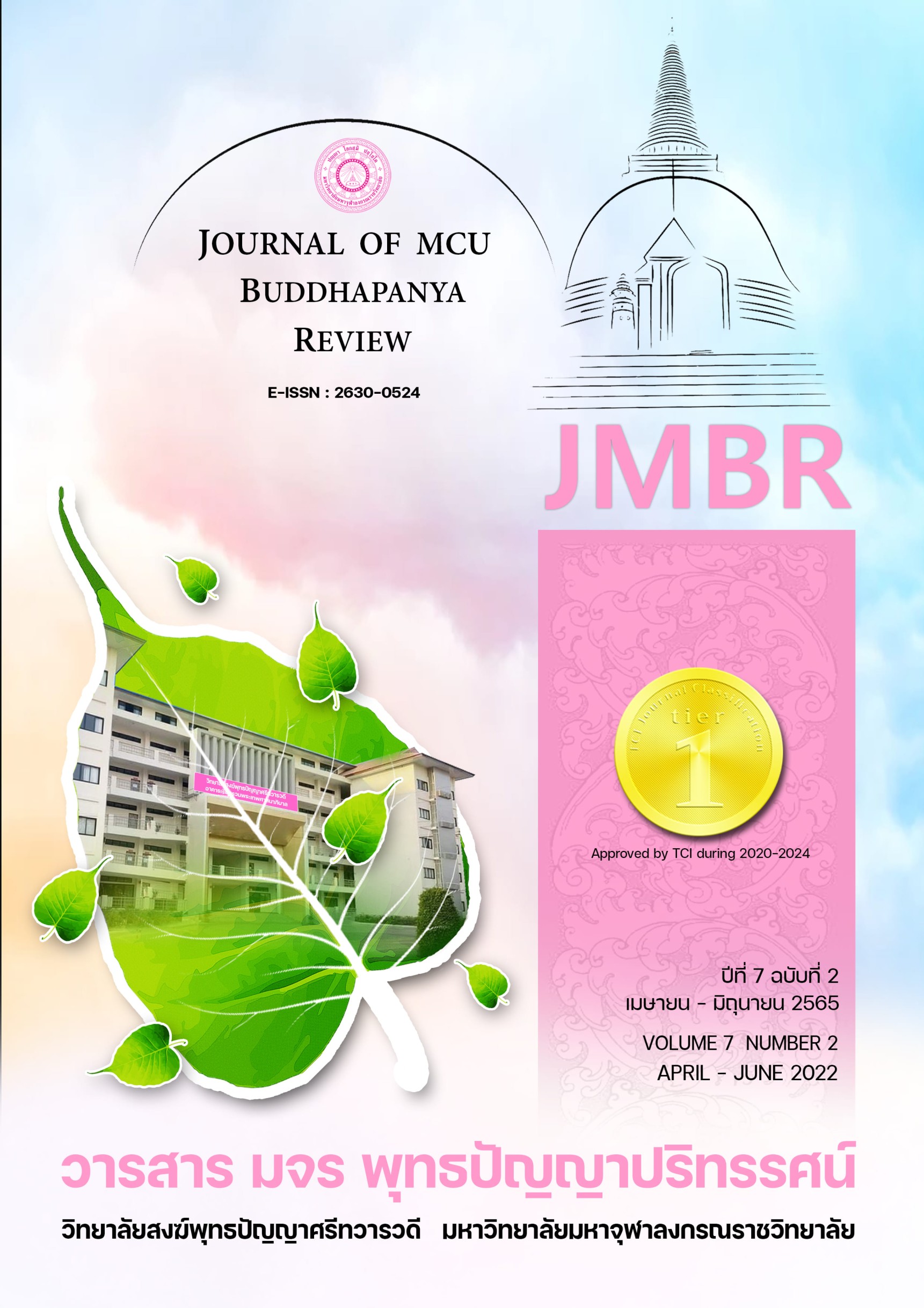ความรับผิดชอบต่อสังคมที่ส่งผลต่อความจงรักภักดีของนักท่องเที่ยวชาวไทย ที่มีต่อโรงแรม 5 ดาว ในกรุงเทพมหานคร
คำสำคัญ:
ความรับผิดชอบต่อสังคม โรงแรม 5 ดาว กรุงเทพมหานคร ความจงรักภักดี นักท่องเที่ยวชาวไทยบทคัดย่อ
งานวิจัยนี้มีวัตถุประสงค์ 1) เพื่อวิเคราะห์องค์ประกอบความรับผิดชอบต่อสังคมของธุรกิจโรงแรม 5 ดาว ในกรุงเทพมหานคร 2) เพื่อศึกษาระดับความจงรักภักดีของนักท่องเที่ยวชาวไทยที่มีต่อโรงแรม 5 ดาว ในกรุงเทพมหานคร และ 3) เพื่อวิเคราะห์ความรับผิดชอบต่อสังคมของธุรกิจโรงแรม 5 ดาว ในกรุงเทพมหานคร ที่ส่งผลต่อความจงรักภักดีของนักท่องเที่ยวชาวไทย กลุ่มตัวอย่าง คือ นักท่องเที่ยวชาวไทย จำนวนทั้งหมด 384 คน โดยคำนวณขนาดกลุ่มตัวอย่างที่ไม่ทราบจำนวนประชากร โดยใช้สูตรของคอแครน ที่ระดับความเชื่อมั่น 95% และคัดเลือกรวบรวมข้อมูลแบบเจาะจงกับผู้ที่เคยใช้บริการโรงแรม 5 ดาว ในกรุงเทพมหานคร อย่างน้อย 1 ครั้ง เครื่องมือที่ใช้รวบรวมข้อมูล คือ แบบสอบถามเพื่อศึกษาความรับผิดชอบต่อสังคมของธุรกิจโรงแรม 5 ดาว ในกรุงเทพมหานคร ที่ส่งผลต่อความจงรักภักดีของนักท่องเที่ยวชาวไทย วิเคราะห์ข้อมูลด้วยค่าความถี่ ค่าร้อยละ ค่าเฉลี่ย ค่าส่วนเบี่ยงเบนมาตรฐาน การวิเคราะห์องค์ประกอบ และการวิเคราะห์การถดถอยพหุคูณ ผลการวิจัยพบว่า องค์ประกอบความรับผิดชอบต่อสังคมของธุรกิจโรงแรม 5 ดาว ในกรุงเทพมหานคร ประกอบด้วย 6 องค์ประกอบ โดยการกำกับดูแลกิจการที่ดีและเผยแพร่นวัตกรรมมีความสำคัญมากที่สุด รองลงมาคือ การพัฒนาชุมชนและสังคม ความรับผิดชอบต่อผู้บริโภค การประกอบธุรกิจด้วยความเป็นธรรม การดูแลรักษาสิ่งแวดล้อม และการเคารพสิทธิมนุษยชน ตามลำดับ นักท่องเที่ยวมีความจงรักภักดีต่อโรงแรม 5 ดาว โดยภาพรวมอยู่ในระดับมากที่สุด ผลการวิเคราะห์การพยากรณ์ พบว่า ปัจจัยความรับผิดชอบต่อสังคม ได้แก่ การกำกับดูแลกิจการที่ดีและเผยแพร่นวัตกรรม และการพัฒนาชุมชนและสังคม มีอิทธิพลต่อความจงรักภักดีของนักท่องเที่ยวชาวไทย
เอกสารอ้างอิง
Corporate Social Responsibility Institute. (2009). Compass of business for society. Bangkok : Icon Printing.
GSB Research Center. (2018). Fundamental economic states. Retrieved from https://www.gsbresearch.or.th.
Lovelock C. and Wright L. (2007). Principles of Service Marketing and Management. 2nd ed.New Jersey: Prentice Hall.
Odin, Yorick & Odin, Nathalie & Valette-Florence, Pierre. (2001). "Conceptual and operational aspects of brand loyalty: an empirical investigation," Journal of Business Research, Elsevier, vol. 53(2), 75-84.
Patricia M., Andrea P. and Ignacio R. (2014). Measuring Corporate Social Responsibility intourism: Development and validation of an efficient scale in the hospitality industry. Journal of Travel & Tourism Marketing, 30(1), 365–385.
Pearce, M. (1997). The True Science of Nurturing Marketing. Marketing Technique, 97(7), 6-8.
Polyorat, K. and Sophonsiri, S. (2010). The influence of service quality dimensions on Customer satisfaction and customer loyalty in the chain restaurant context : A Thai
case. Journal of Global Business and Technology, 6(2), 64-76.
puksupang Srisawat. (2011). The relationship between social responsibility (CSR) and the image of The Siam Cement Group (SCG) organization in terms of consumers in Bangkok. The thesis in master degree, major of marketing, Rajamangala University of Technology Thanyaburi.
Siddiqi, K. O. (2011). Interrelations between service quality attributes, customer satisfaction
and customer loyalty in the retail banking sector in Bangladesh, International Journal
of Business and Management, 6(3), 12-36.
Sung-Bum K. and Dae-Young K. (2016). The influence of corporate social responsibility, ability,
reputation, and transparency on hotel customer loyalty in the U.S.: a gender-based
approach. Kim and Kim SpringerPlus, 10(1), 1-13.
Thanawan Rangyai. (2017). Customers’ Loyalty Model of Hotel Businesses in Bangkok and Perimeter. The academic journal of Phranakhon Rajabhat University, 10(1), 41-51.
Theerawut Akakul. (2000). Research Methods in Behavioral Sciences and Social Sciences. Ubon Ratchathani : Ubon ratchathani rajabhat university.
Wanida Hanchalearn (2016). Relationship between CorporateSocial ResponsibilityBased on Green Leaf Standard andEmployee Commitment in Hotel Businessin Phuket. The journal of Phuket Rajabhat University, 12(2), 81-106.
Yut Kaiwan. (2013). Using Minitab software in analyzing the statistics for research. Bangkok : Chulalongkorn University.
ดาวน์โหลด
เผยแพร่แล้ว
รูปแบบการอ้างอิง
ฉบับ
ประเภทบทความ
สัญญาอนุญาต
ลิขสิทธิ์ (c) 2022 วารสาร มจร พุทธปัญญาปริทรรศน์

อนุญาตภายใต้เงื่อนไข Creative Commons Attribution-NonCommercial-NoDerivatives 4.0 International License.



